英语一般将来时用法总结(完整)
- 格式:doc
- 大小:68.50 KB
- 文档页数:9
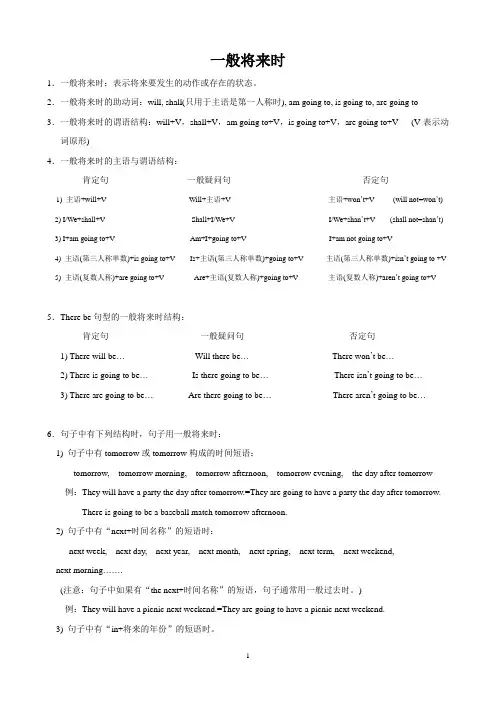
一般将来时1.一般将来时:表示将来要发生的动作或存在的状态。
2.一般将来时的助动词:will, shall(只用于主语是第一人称时), am going to, is going to, are going to3.一般将来时的谓语结构:will+V,shall+V,am going to+V,is going to+V,are going to+V (V表示动词原形)4.一般将来时的主语与谓语结构:肯定句一般疑问句否定句1) 主语+will+V Will+主语+V 主语+won’t+V (will not=won’t)2) I/We+shall+V Shall+I/We+V I/We+shan’t+V (shall not=shan’t)3) I+am going to+V Am+I+going to+V I+am not going to+V4) 主语(第三人称单数)+is going to+V Is+主语(第三人称单数)+going to+V 主语(第三人称单数)+isn’t going to +V5) 主语(复数人称)+are going to+V Are+主语(复数人称)+going to+V 主语(复数人称)+aren’t going to+V5.There be句型的一般将来时结构:肯定句一般疑问句否定句1) There will be…Will there be…There won’t be…2) There is going to be…Is there going to be…There isn’t going to be…3) There are going to be…Are there going to be…There aren’t going to be…6.句子中有下列结构时,句子用一般将来时:1) 句子中有tomorrow或tomorrow构成的时间短语:tomorrow, tomorrow morning, tomorrow afternoon, tomorrow evening, the day after tomorrow 例:They will have a party the day after tomorrow.=They are going to have a party the day after tomorrow.There is going to be a baseball match tomorrow afternoon.2) 句子中有“next+时间名称”的短语时:next week, next day, next year, next month, next spring, next term, next weekend,next morning…….(注意:句子中如果有“the next+时间名称”的短语,句子通常用一般过去时。
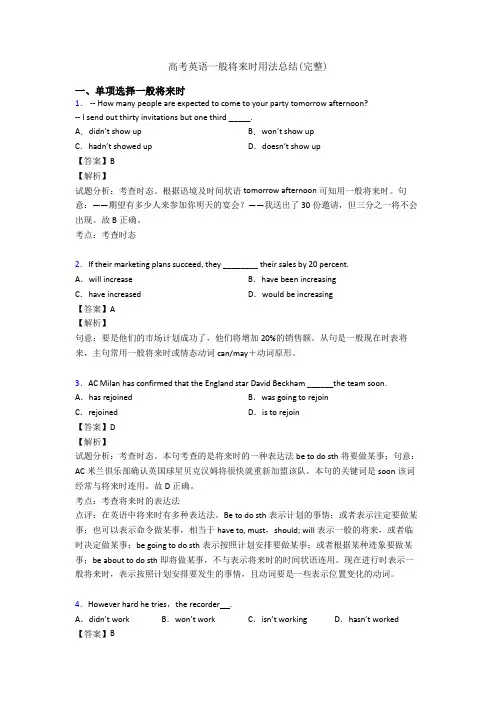
高考英语一般将来时用法总结(完整)一、单项选择一般将来时1. -- How many people are expected to come to your party tomorrow afternoon?-- I send out thirty invitations but one third _____.A.didn’t show up B.won’t show upC.hadn’t showed up D.doesn’t show up【答案】B【解析】试题分析:考查时态。
根据语境及时间状语tomorrow afternoon可知用一般将来时。
句意:——期望有多少人来参加你明天的宴会?——我送出了30份邀请,但三分之一将不会出现。
故B正确。
考点:考查时态2.If their marketing plans succeed, they ________ their sales by 20 percent.A.will increase B.have been increasingC.have increased D.would be increasing【答案】A【解析】句意:要是他们的市场计划成功了,他们将增加20%的销售额。
从句是一般现在时表将来,主句常用一般将来时或情态动词can/may+动词原形。
3.AC Milan has confirmed that the England star David Beckham ______the team soon. A.has rejoined B.was going to rejoinC.rejoined D.is to rejoin【答案】D【解析】试题分析:考查时态。
本句考查的是将来时的一种表达法be to do sth将要做某事;句意:AC米兰俱乐部确认英国球星贝克汉姆将很快就重新加盟该队。
本句的关键词是soon该词经常与将来时连用。
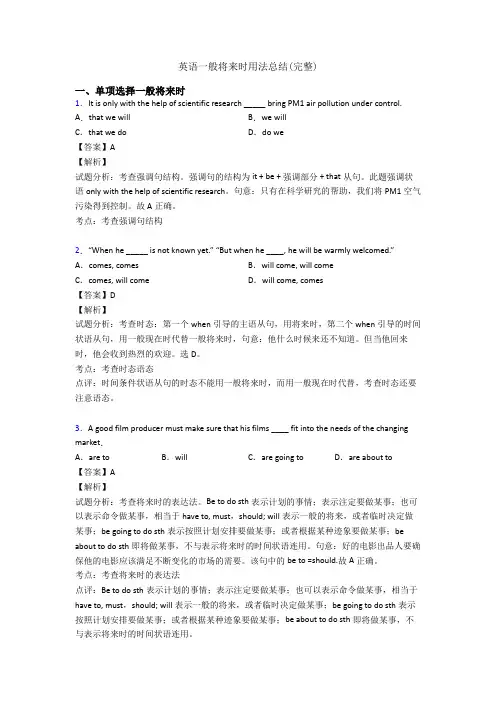
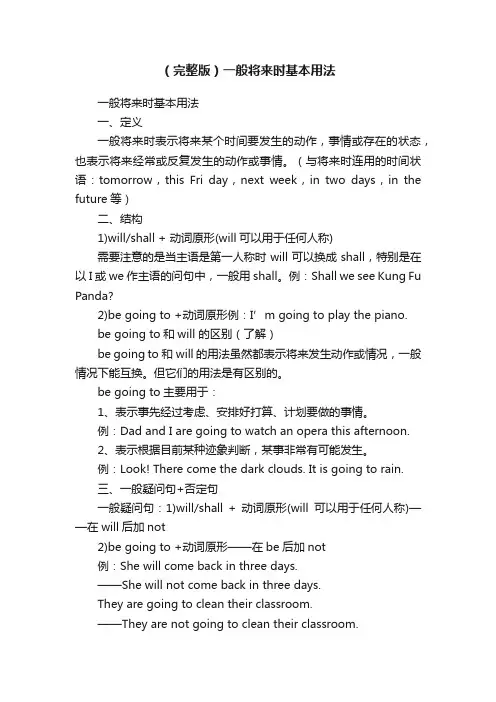
(完整版)一般将来时基本用法一般将来时基本用法一、定义一般将来时表示将来某个时间要发生的动作,事情或存在的状态,也表示将来经常或反复发生的动作或事情。
(与将来时连用的时间状语:tomorrow,this Fri day,next week,in two days,in the future等)二、结构1)will/shall + 动词原形(will可以用于任何人称)需要注意的是当主语是第一人称时will可以换成shall,特别是在以I或we作主语的问句中,一般用shall。
例:Shall we see Kung Fu Panda?2)be going to +动词原形例:I’m going to play the piano.be going to和will 的区别(了解)be going to和will 的用法虽然都表示将来发生动作或情况,一般情况下能互换。
但它们的用法是有区别的。
be going to主要用于:1、表示事先经过考虑、安排好打算、计划要做的事情。
例:Dad and I are going to watch an opera this afternoon.2、表示根据目前某种迹象判断,某事非常有可能发生。
例:Look! There come the dark clouds. It is going to rain.三、一般疑问句+否定句一般疑问句:1)will/shall + 动词原形(will可以用于任何人称)——在will后加not2)be going to +动词原形——在be后加not例:She will come back in three days.——She will not come back in three days.They are going to clean their classroom.——They are not going to clean their classroom.否定句:1)will/shall + 动词原形(will可以用于任何人称)——will 提前2)be going to +动词原形——be提前例:She will come back in three days.——Will she come back in three days?They are going to clean their classroom.——Are they going to clean their classroom?Ps:will not=won’t shall not=shan’twill可以缩写成‘ll。
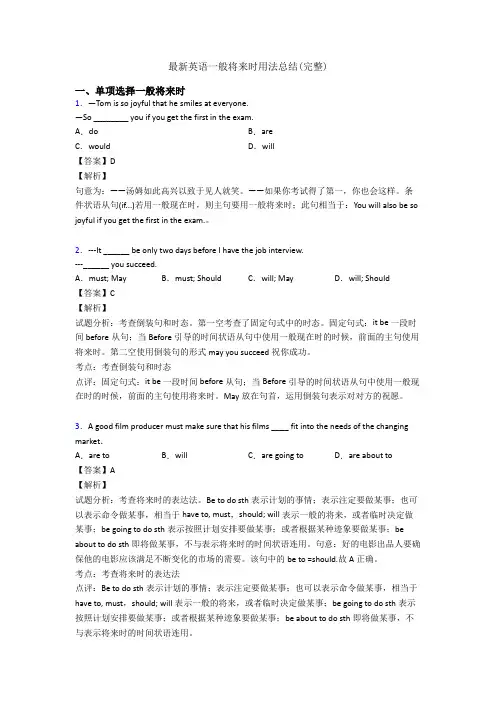
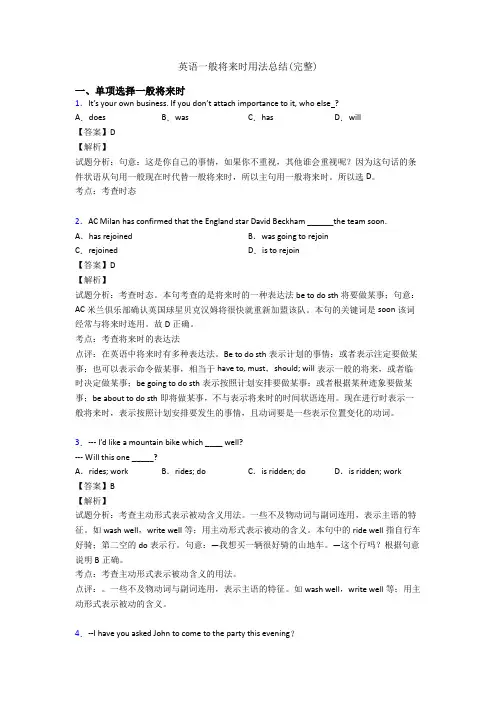
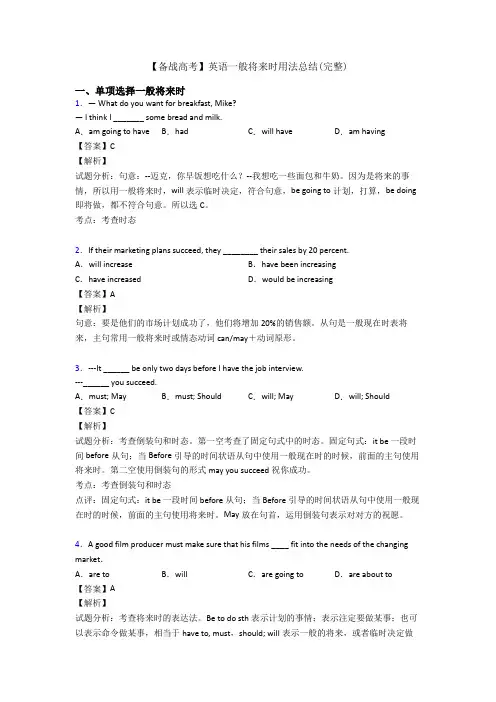
【备战高考】英语一般将来时用法总结(完整)一、单项选择一般将来时1.— What do you want for breakfast, Mike?— I think I _______ some bread and milk.A.am going to have B.had C.will have D.am having【答案】C【解析】试题分析:句意:--迈克,你早饭想吃什么?--我想吃一些面包和牛奶。
因为是将来的事情,所以用一般将来时,will表示临时决定,符合句意,be going to计划,打算,be doing 即将做,都不符合句意。
所以选C。
考点:考查时态2.If their marketing plans succeed, they ________ their sales by 20 percent.A.will increase B.have been increasingC.have increased D.would be increasing【答案】A【解析】句意:要是他们的市场计划成功了,他们将增加20%的销售额。
从句是一般现在时表将来,主句常用一般将来时或情态动词can/may+动词原形。
3.---It ______ be only two days before I have the job interview.---______ you succeed.A.must; May B.must; Should C.will; May D.will; Should【答案】C【解析】试题分析:考查倒装句和时态。
第一空考查了固定句式中的时态。
固定句式:it be 一段时间 before从句;当Before引导的时间状语从句中使用一般现在时的时候,前面的主句使用将来时。
第二空使用倒装句的形式may you succeed祝你成功。
考点:考查倒装句和时态点评:固定句式:it be 一段时间 before从句;当Before引导的时间状语从句中使用一般现在时的时候,前面的主句使用将来时。
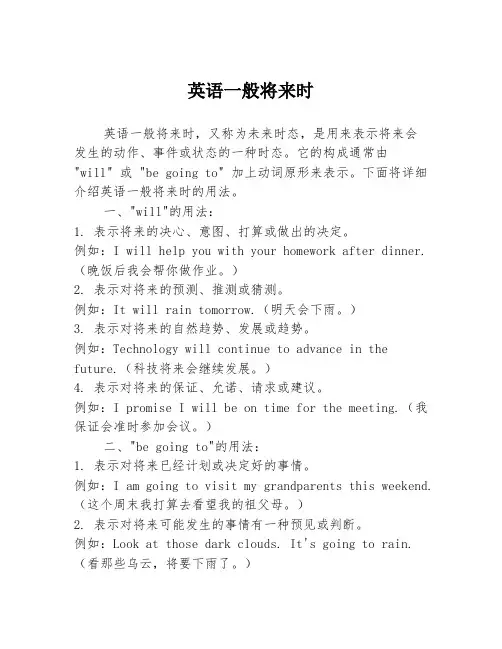
英语一般将来时英语一般将来时,又称为未来时态,是用来表示将来会发生的动作、事件或状态的一种时态。
它的构成通常由"will" 或 "be going to" 加上动词原形来表示。
下面将详细介绍英语一般将来时的用法。
一、"will"的用法:1. 表示将来的决心、意图、打算或做出的决定。
例如:I will help you with your homework after dinner.(晚饭后我会帮你做作业。
)2. 表示对将来的预测、推测或猜测。
例如:It will rain tomorrow.(明天会下雨。
)3. 表示对将来的自然趋势、发展或趋势。
例如:Technology will continue to advance in the future.(科技将来会继续发展。
)4. 表示对将来的保证、允诺、请求或建议。
例如:I promise I will be on time for the meeting.(我保证会准时参加会议。
)二、"be going to"的用法:1. 表示对将来已经计划或决定好的事情。
例如:I am going to visit my grandparents this weekend.(这个周末我打算去看望我的祖父母。
)2. 表示对将来可能发生的事情有一种预见或判断。
例如:Look at those dark clouds. It's going to rain.(看那些乌云,将要下雨了。
)3. 表示以现有证据或迹象预测未来。
例如:She's been studying very hard. She's going to pass the exam.(她一直学得很努力,她一定会通过考试的。
)三、注意事项:1. 一般将来时中的时间状语词可以是今天、明天、以后、将来、下个月等表示将来的时间状语词。
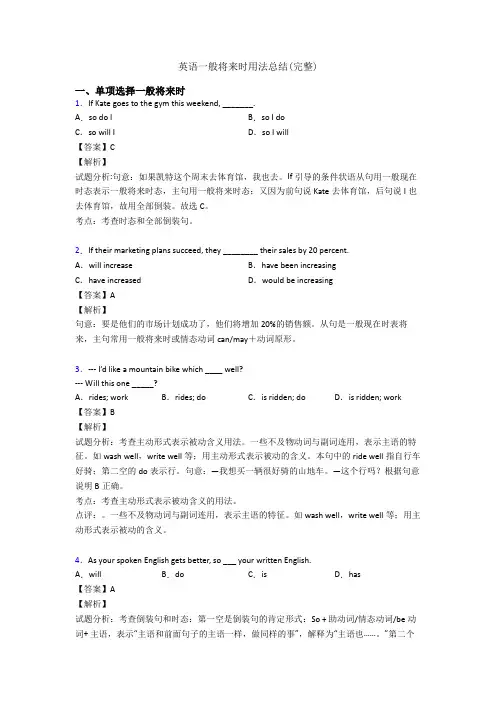
英语一般将来时用法总结(完整)一、单项选择一般将来时1.If Kate goes to the gym this weekend, _______.A.so do I B.so I doC.so will I D.so I will【答案】C【解析】试题分析:句意:如果凯特这个周末去体育馆,我也去。
If引导的条件状语从句用一般现在时态表示一般将来时态,主句用一般将来时态;又因为前句说Kate去体育馆,后句说I也去体育馆,故用全部倒装。
故选C。
考点:考查时态和全部倒装句。
2.If their marketing plans succeed, they ________ their sales by 20 percent.A.will increase B.have been increasingC.have increased D.would be increasing【答案】A【解析】句意:要是他们的市场计划成功了,他们将增加20%的销售额。
从句是一般现在时表将来,主句常用一般将来时或情态动词can/may+动词原形。
3.--- I’d like a mountain bi ke which ____ well?--- Will this one _____?A.rides; work B.rides; do C.is ridden; do D.is ridden; work【答案】B【解析】试题分析:考查主动形式表示被动含义用法。
一些不及物动词与副词连用,表示主语的特征。
如wash well,write well等;用主动形式表示被动的含义。
本句中的ride well指自行车好骑;第二空的do表示行。
句意:—我想买一辆很好骑的山地车。
—这个行吗?根据句意说明B正确。
考点:考查主动形式表示被动含义的用法。
点评:。
一些不及物动词与副词连用,表示主语的特征。
如wash well,write well等;用主动形式表示被动的含义。
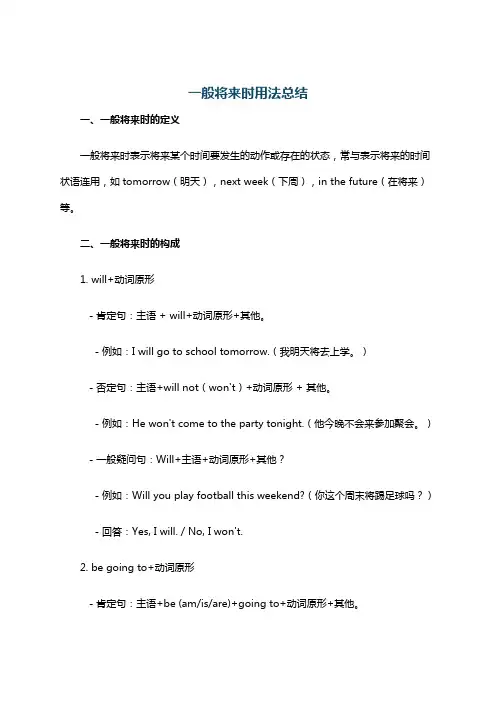
一般将来时用法总结一、一般将来时的定义一般将来时表示将来某个时间要发生的动作或存在的状态,常与表示将来的时间状语连用,如tomorrow(明天),next week(下周),in the future(在将来)等。
二、一般将来时的构成1. will+动词原形- 肯定句:主语 + will+动词原形+其他。
- 例如:I will go to school tomorrow.(我明天将去上学。
)- 否定句:主语+will not(won't)+动词原形 + 其他。
- 例如:He won't come to the party tonight.(他今晚不会来参加聚会。
) - 一般疑问句:Will+主语+动词原形+其他?- 例如:Will you play football this weekend?(你这个周末将踢足球吗?) - 回答:Yes, I will. / No, I won't.2. be going to+动词原形- 肯定句:主语+be (am/is/are)+going to+动词原形+其他。
- 例如:She is going to visit her grandparents next month.(她打算下个月去看望她的祖父母。
)- 否定句:主语+be (am/is/are)+not+going to+动词原形+其他。
- 例如:They are not going to have a meeting this afternoon.(他们今天下午不打算开会。
)- 一般疑问句:Be (am/is/are)+主语+going to+动词原形+其他?- 例如:Are you going to do your homework tonight?(你今晚打算做你的家庭作业吗?)- 回答:Yes, I am. / No, I'm not.三、一般将来时的用法1. 表示将来的计划或打算(be going to侧重于计划打算;will侧重于意愿)- I'm going to study hard this term.(我打算这个学期努力学习。
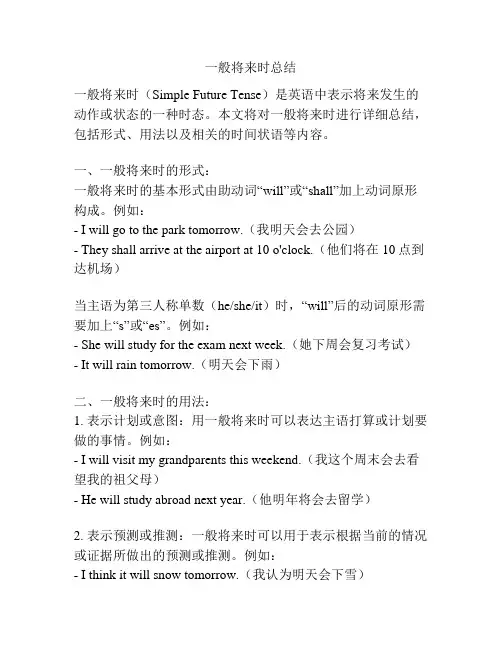
一般将来时总结一般将来时(Simple Future Tense)是英语中表示将来发生的动作或状态的一种时态。
本文将对一般将来时进行详细总结,包括形式、用法以及相关的时间状语等内容。
一、一般将来时的形式:一般将来时的基本形式由助动词“will”或“shall”加上动词原形构成。
例如:- I will go to the park tomorrow.(我明天会去公园)- They shall arrive at the airport at 10 o'clock.(他们将在10点到达机场)当主语为第三人称单数(he/she/it)时,“will”后的动词原形需要加上“s”或“es”。
例如:- She will study for the exam next week.(她下周会复习考试)- It will rain tomorrow.(明天会下雨)二、一般将来时的用法:1. 表示计划或意图:用一般将来时可以表达主语打算或计划要做的事情。
例如:- I will visit my grandparents this weekend.(我这个周末会去看望我的祖父母)- He will study abroad next year.(他明年将会去留学)2. 表示预测或推测:一般将来时可以用于表示根据当前的情况或证据所做出的预测或推测。
例如:- I think it will snow tomorrow.(我认为明天会下雪)- They believe she will win the competition.(他们相信她会赢得比赛)3. 表示意愿或允诺:一般将来时可以表达主语的意愿或承诺要做某事。
例如:- I will help you with your homework.(我会帮你做作业)- He will stop smoking.(他将戒烟)4. 表示预定的事件或安排的计划:一般将来时可以用于表示已经安排好的事件或计划。
高考英语一般将来时用法总结(完整)一、单项选择一般将来时1.With a travelling speed of up to 350 kilometres per hour, the railway to be built between Beijing and Shanghai _______ the journey time from 12 hours to 5 hours.A.cuts B.will cut C.is cutting D.has cut【答案】B【解析】考查时态。
句意“将要被建的北京至上海的铁路,时速达350Km/时,将把两地的旅途用时从12小时缩短到5小时。
”根据to be built可知,铁路是将要建设,故用将来时。
故选B。
2.Japan’s economy _______ in the past twenty years. No one knows how long it ______ before it regains its increase.A.has been declining; will be B.has declined; would beC.had been in decline; would take D.was on the decline; will take【答案】A【解析】试题分析:考查动词的时态和语态,。
句义:在过去的二十年里日本经济已经下滑了。
没有人知道再过多久才能恢复增长。
考点:动词的时态和语态,3.--Jack! I have left my key to the office at home.-- Don’t worry. I _________ it for you. Wait a minute.A.get B.am going to get C.will get D.am getting【答案】C【解析】试题分析:考查时态:句意:--杰克!我把钥匙忘在办公室了。
英语一般将来时的用法英语一般将来时(Simple Future Tense)表示将要发生的动作或状态。
它通常用于描述在未来某个时间会发生的事件、计划、安排或预测。
以下是一般将来时的用法:1. 使用助动词will + 动词原形:这是构成一般将来时的基本结构。
例如:- I will go to the gym tomorrow.(我明天会去健身房。
)- They will visit their grandparents next week.(他们下周会去看望他们的祖父母。
)2. 在口语中,will有时可以缩写为'll,特别是在美国英语中。
例如:- She'll call me later tonight.(她今晚晚些时候会给我打电话。
)- We'll have a party for his birthday.(我们会为他的生日举办一个派对。
)3. 在疑问句和否定句中,将will提前到主语之前。
例如:- Will you come to the meeting tomorrow?(你明天会来参加会议吗?)- They will not be able to attend the concert.(他们不能参加音乐会。
)4. 表示习惯性动作的未来时,可以使用be going to + 动词原形。
例如:- He is going to play basketball after work every day.(他每天下班后都会打篮球。
)- She is going to study abroad next year.(她明年打算出国留学。
)5. 表示按计划或安排将要发生的事情,可以使用现在进行时。
例如:- The train is leaving at 6 pm.(火车将在下午6点离开。
)- The concert starts in an hour.(音乐会一小时后开始。
)6. 表示预测或推测未来可能发生的情况,可以使用情态动词may, might, could, should, must等。
一般将来时的用法一般将来时表示在现在看来即将要发生的动作或存在的状态。
常用时间副词tomorrow, soon或短语next year / week / month, in a fewdays, in the future, sometime 做状语。
接下来小编为大家整理了一般将来时的用法,希望对你有帮助哦!一、主语 + be going to + 动词原形肯定句:I am going to get up.He is going to get up.They are going to get up.否定句:I am not going to get up.He is not going to get up.They are not going to get up.一般疑问句:Are you going to get up?肯定回答:Yes, I am.否定回答:No, I’m not.一般疑问句:Is he going to get up?肯定回答:Yes, he is.否定回答:No, he isn’t.一般疑问句:Are they going to get up?肯定回答:Yes, they are.否定回答:No, they aren’t.二、主语 + will + 动词原形肯定句:I will get up.He will get up.They will get up.否定句:I will not get up.He will not get up.They will not get up.一般疑问句:Will you get up?肯定回答:Yes, I will.否定回答:No, I won’t.一般疑问句:Will he get up.肯定回答:Yes, he will.否定回答:No, he won’t.一般疑问句:Are they going to get up?肯定回答:Yes, they are.否定回答:No, they aren’t.一般将来时/式(The Simple Future tense)时态定义be going to表主观的打算shall和will常常缩写成'll ,紧接在主语之后。
英语⼀般将来时⽤法总结(完整)英语⼀般将来时⽤法总结(完整)⼀、单项选择⼀般将来时1.Peace is necessary to all. After all, it is the United States and China, as the two largest economies in the world, that________ most from a peaceful and stable Asia-Pacific.A.are benefited B.will benefitC.will be benefited D.had benefited【答案】B【解析】试题分析:根据语境“美国和中国将受益于⼀个和平稳定的亚太地区”可知该句要⽤⼀般将来时,故选B。
考点:考查时态2.--- I’d like a mountain bike which ____ well?--- Will this one _____?A.rides; work B.rides; do C.is ridden; do D.is ridden; work【答案】B【解析】试题分析:考查主动形式表⽰被动含义⽤法。
⼀些不及物动词与副词连⽤,表⽰主语的特征。
如wash well,write well等;⽤主动形式表⽰被动的含义。
本句中的ride well指⾃⾏车好骑;第⼆空的do表⽰⾏。
句意:—我想买⼀辆很好骑的⼭地车。
—这个⾏吗?根据句意说明B正确。
考点:考查主动形式表⽰被动含义的⽤法。
点评:。
⼀些不及物动词与副词连⽤,表⽰主语的特征。
如wash well,write well等;⽤主动形式表⽰被动的含义。
3.It every day so far this month. I can't tell you if it tomorrow.A.rained; rains B.is raining; shall rainC.has been raining; rains D.has rained; will rain【答案】D【解析】试题分析:本题第⼀空应该使⽤现在完成式,关键词是后⾯的时间状语so far(到⽬前为⽌),so far通常都是和现在完成时连⽤。
一般将来时的用法及常见句型总结一般将来时是英语中用来表示将来发生的动作或状态的一种时态。
在句子中,一般将来时通常与表示将来的时间状语词搭配使用,如tomorrow(明天)、next week(下周)、in the future(将来)等。
同时,一般将来时也可以使用助动词will或shall来构成。
下面将介绍一般将来时的用法及常见句型。
1. 一般将来时的肯定句结构:主语 + will/shall + 动词原形 + 其他成分例如:- I will go to the park tomorrow.(我明天将去公园。
)- They will watch a movie tonight.(他们今晚将要看电影。
)2. 一般将来时的否定句结构:主语 + will/shall + not + 动词原形 + 其他成分例如:- She will not join the party.(她不会参加派对。
)- We shall not travel to Europe.(我们不会去欧洲旅行。
)3. 一般将来时的疑问句结构:Will/Shall + 主语 + 动词原形 + 其他成分?- Will you come to the concert?(你会来听音乐会吗?)- Shall we visit the museum tomorrow?(我们明天要参观博物馆吗?)4. 一般将来时的特殊用法:a. 表示计划或安排例如:- We will have a meeting next Monday.(我们下周一要开会。
)- They will go on a vacation in August.(他们八月份将去度假。
)b. 表示意愿或意图例如:- He will help you with your homework.(他愿意帮你做作业。
)- She shall buy a new car soon.(她打算很快买辆新车。
)c. 表示预测或推断例如:- It will rain tomorrow.(明天会下雨。